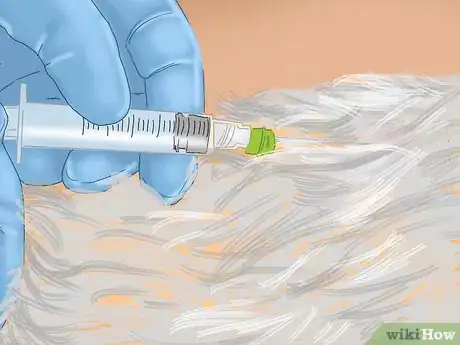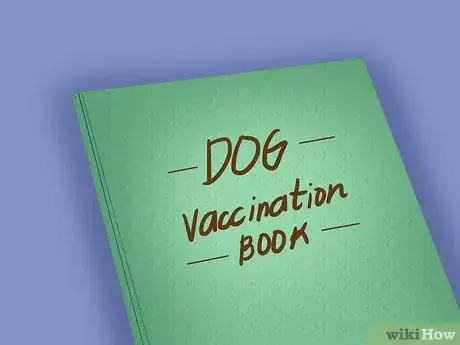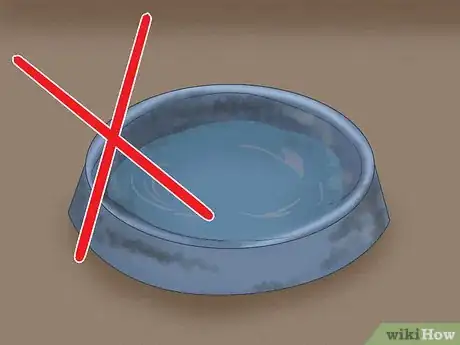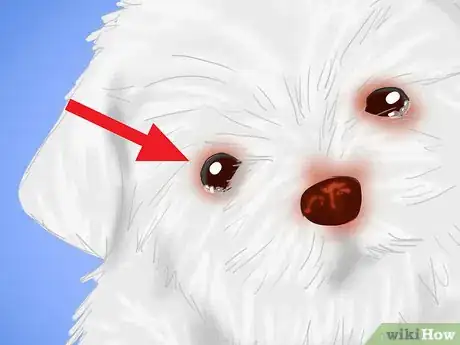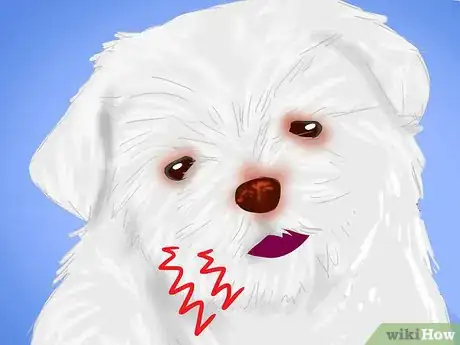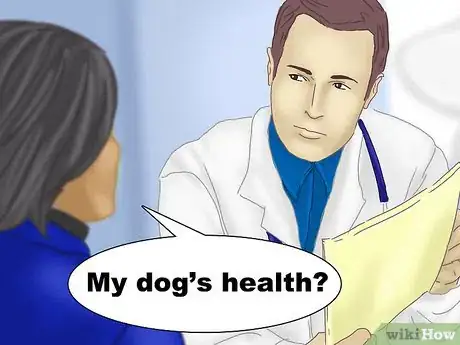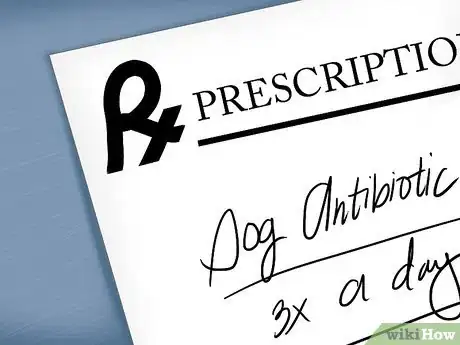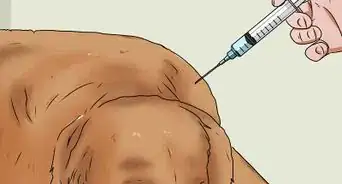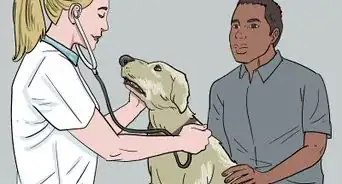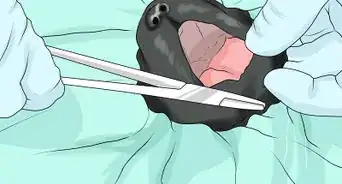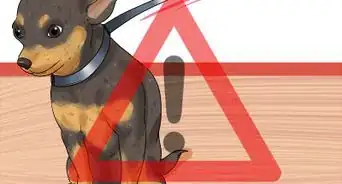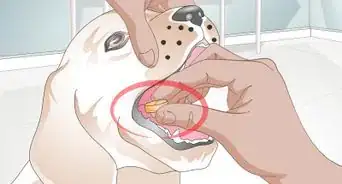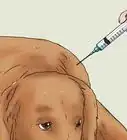This article was co-authored by Cameron Thompsen. Cameron Thompsen is a Dog Trainer and Human Coach, as well as the Owner and Founder of Hope2K9 Foundation. With nearly two decades of experience, she specializes in working with dogs and their owners on behavior issues ranging from severe anxiety, reactivity, as well as aggression and fear-based problems. She works with all dogs at Hope2K9 so that they are fully trained before adoption, and provides lifelong support to dog owners after adoption.
There are 9 references cited in this article, which can be found at the bottom of the page.
This article has been viewed 24,173 times.
Kennel cough is a respiratory disease, otherwise known as infectious canine tracheobronchitis. It is caused by both viral and bacterial diseases, the most common causes being the bacteria Bordetella bronchiseptica and the canine parainfluenza virus.[1] Essentially, it is an infection of the windpipe and the voice box similar to human bronchitis.[2] The disease is highly contagious, but there are steps you, as a dog owner, can take to prevent your dog from coming down with it.
Steps
Preventing Kennel Cough
-
1Get your dog vaccinated. The primary way to prevent kennel cough is to keep your dog vaccinated.[3] The core vaccine also includes vaccination against common viruses that contribute to kennel cough development.[4] [5]
- There is also a vaccine effective against Bordetella bronchiseptica, which can also cause kennel cough. Your veterinarian will let you know which vaccinations are more important for your dog to receive.
-
2Get your dog's vaccination updated. Just doing the vaccination one time is not effective forever. You need to get your dog a booster of its vaccination on a regular basis.[6] In general, the first booster is given after one year, and then subsequent boosters are given every three years.[7]
- New strains of kennel cough occur regularly. Getting your dog's vaccination updated can increase the likelihood that your dog will be protected.
- Because of the many causes of kennel cough, vaccination will not guarantee 100% that your dog will not get the disease. However, it will reduce the chances considerably.[8]
Advertisement -
3Keep unvaccinated dogs away from other dogs. Dogs and puppies that are exposed to a lot of other dogs are at increased risk for this disease.[9] This contact can occur at dog parks, groomers, puppy classes, obedience classes, and boarding at kennels.
- Keeping puppies isolated from other dogs, except litter mates and the mother, until they can get vaccinated is a good idea. Puppies don't usually get vaccinated against the causes of kennel cough until they are around four months old. However, some of the intranasal drops can be given to puppies as young as three weeks of age.
-
4Don't allow your dog to drink out of communal water dishes. When dogs drink out of a common bowl, droplets from an infected dog’s nasal and mouth secretion can contaminate the water and bowl with Bordatella. When an uninfected and unvaccinated dog laps the water, it can contract the bacteria and come down with kennel cough.[10]
- To avoid this completely don’t share water or food bowls and wash them frequently in hot, soapy water. The same applies to toys that dogs may share while they are playing.
Identifying and Treating Kennel Cough
-
1Look for the symptoms of kennel cough. The most notable sign of a dog with kennel cough is a persistent cough. The dog will cough continuously with a distinctive “goose honk” sound. Many time this is the only sign in the dog, with it appearing healthy otherwise. However, this cough lingers on for weeks and some dogs will also show other signs such as:[11]
- Gagging or coughing up a white foamy phlegm
- Fever
- Discharge from the nose
- Watery eyes
- Decreased appetite
-
2Keep an eye out for symptoms of an even more severe infection. Occasionally, kennel cough can make a dog susceptible to developing pneumonia. This will make a dog experience more severe symptoms, including lethargy, difficulty breathing and, even in a few cases, death.[12]
-
3Keep a dog with possible infection away from other dogs. It's important to limit the risk of spreading the disease, even if you are not sure if your dog actually has it. This is the responsible thing to do.[13]
- Keep your dog away from dog parks or facilities that care for dogs, such as doggie day cares and boarding facilities, until your vet has cleared your dog's health.
- Pick up your dog's feces. You should probably do this whether your dog is infected or not but infected feces cause a health hazard. An uninfected dog having contact with infected feces is one way that the infection can spread.[14]
-
4Follow your veterinarian's suggestions for treatment and care. Kennel cough generally will run its course in 1 to 3 weeks with no treatment needed. However, some owners are annoyed by the constant coughing, so drugs to suppress the cough and reduce windpipe inflammation can be given through a prescription from a veterinarian.[15] [16]
- In more severe cases, antibiotics which are effective against Bordetella can be given.
- A dog which is actively coughing should not do any heavy exercise such as running, as this will aggravate the cough.
- Food and water intake should be monitored and encouraged to make sure the dog keeps eating and drinking.
- Collars used during leash walking may press against the dog’s windpipe causing severe irritation. Using a harness instead will help prevent this from happening.
Warnings
- If your dog does come down with the signs of kennel cough, monitor for any signs of pneumonia, including lethargy, lack of appetite, difficulty breathing. If you see these, contact your veterinarian for treatment.⧼thumbs_response⧽
References
- ↑ http://www.vetmed.ucdavis.edu/vmth/small_animal/internal_medicine/newsletters/vaccination_protocols.cfm
- ↑ http://www.aspca.org/pet-care/dog-care/common-dog-diseases
- ↑ Cameron Thompsen. Dog Trainer. Expert Interview. 31 March 2022.
- ↑ https://www.akc.org/expert-advice/health/kennel-cough-symptoms-treatment-and-prevention/
- ↑ http://www.vetmed.ucdavis.edu/vmth/small_animal/internal_medicine/newsletters/vaccination_protocols.cfm
- ↑ Cameron Thompsen. Dog Trainer. Expert Interview. 31 March 2022.
- ↑ http://www.vetmed.ucdavis.edu/vmth/small_animal/internal_medicine/newsletters/vaccination_protocols.cfm
- ↑ http://vetmed.illinois.edu/pet_column/new-dog-flu-invites-closer-look-at-viruses-vaccines/
- ↑ Cameron Thompsen. Dog Trainer. Expert Interview. 31 March 2022.
- ↑ https://cvm.ncsu.edu/canineflu/
- ↑ http://www.merckvetmanual.com/mvm/respiratory_system/respiratory_diseases_of_small_animals/tracheobronchitis_in_small_animals.html
- ↑ http://www.petmd.com/dog/conditions/respiratory/c_dg_canine_tracheobronchitis
- ↑ http://sheltermedicine.vetmed.ufl.edu/shelter-services/tools-tips-fact-sheets/canine-influenza/#civ-shelters-10
- ↑ https://cvm.ncsu.edu/canineflu/
- ↑ https://cvm.ncsu.edu/canineflu/
- ↑ http://sheltermedicine.vetmed.ufl.edu/shelter-services/tools-tips-fact-sheets/canine-influenza/#civ-shelters-10
About This Article
The best way to prevent your dog from getting kennel cough is to have it vaccinated by a vet. Even if your dog has already been vaccinated, you should still take it to the vet for a booster every 3 years. Since kennel cough can be caused by a variety of viruses, vaccination won't protect your dog 100 percent, but it will reduce its chances of becoming infected significantly. Besides having your dog vaccinated, avoid letting it drink out of communal water dishes, like at the dog park, since the infection can spread that way. For advice from our Veterinary co-author, like how to recognize the symptoms of kennel cough, keep reading.
